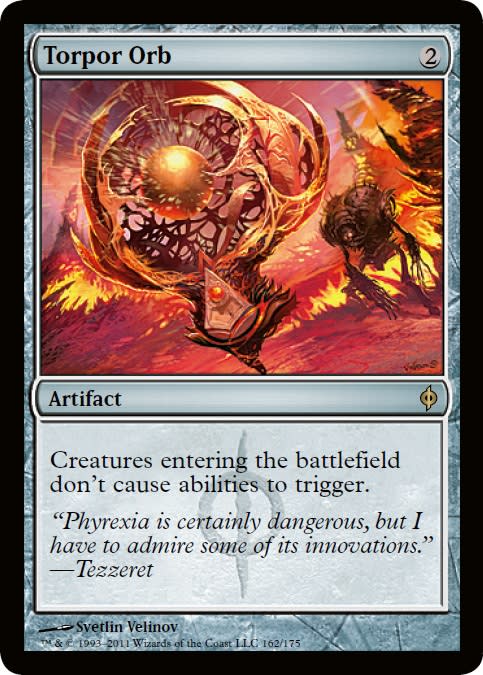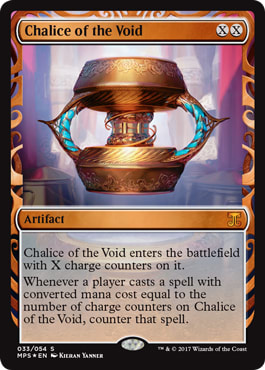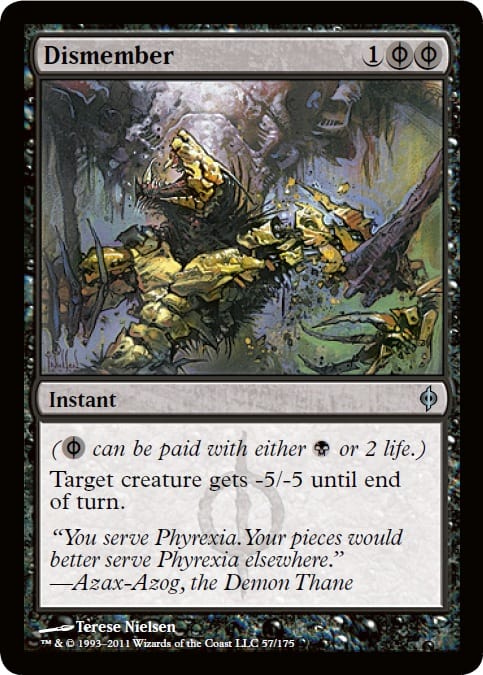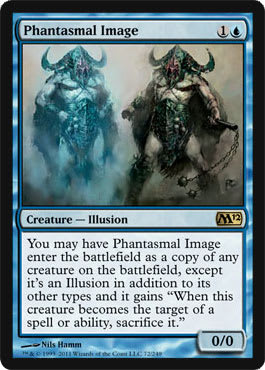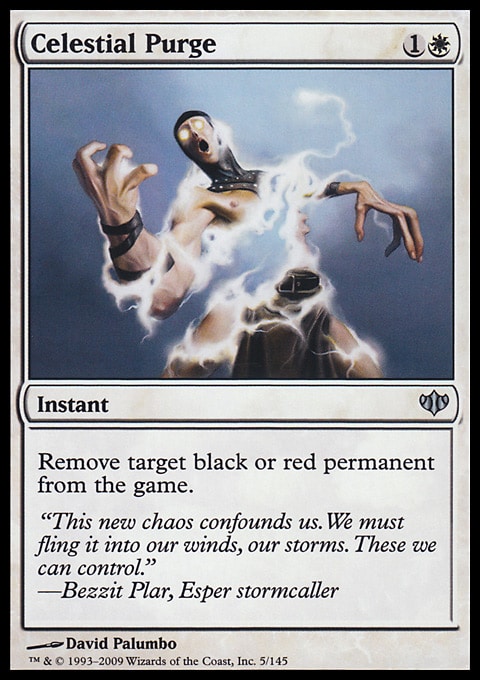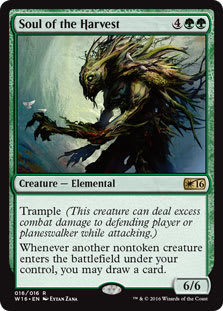This previous weekend and the weekend before that, I had the pleasure of playing two very different formats with two completely different decks.
In Grand Prix: Columbus, I chose to play U/R Tron yet again. I played the following list:
"U/R Tron"
- Creatures (5)
- 1 Wurmcoil Engine
- 1 Ulamog, the Infinite Gyre
- 3 Emrakul, the Aeons Torn
- Spells (30)
- 1 Repeal
- 4 Remand
- 4 Thirst for Knowledge
- 4 Through the Breach
- 3 Compulsive Research
- 4 Pyroclasm
- 1 Prismatic Lens
- 1 Relic of Progenitus
- 4 Expedition Map
- 4 Izzet Signet
- Lands (25)
- 1 Mountain
- 4 Island
- 1 Shivan Reef
- 1 Steam Vents
- 1 Stomping Ground
- 4 Scalding Tarn
- 4 Urza's Mine
- 4 Urza's Power Plant
- 4 Urza's Tower
- 1 Eye of Ugin
- Sideboard (15)
- 3 Relic of Progenitus
- 1 Grafdigger's Cage
- 2 Torpor Orb
- 1 Wurmcoil Engine
- 3 Negate
- 3 Ancient Grudge
- 2 Combust
After this Grand Prix, I figured out a few things that I’d had wrong with this decklist.
First of all, the matchup against B/R burn is bad. Like twenty-percent-match-win bad, and nothing in the sideboard really addresses it. Second, Torpor Orb isn’t really the best way to fight Melira/Kiki Naya Pod decks.
However, I still managed to post a 10–5 record (outside of the money), and I still think it’s a reasonable choice.
Good matchups are Melira Pod, Naya Pod, R/G Tron, W/U Tron, and Affinity.
Even matchups are R/W/U Delver, R/U/G Delver (Tarmogoyf is a nuisance, but the rest of your cards line up very well), W/B tokens (almost a function of how much hand disruption the deck has), Jund (same as W/B tokens except Bob is a nuisance, too).
Bad matchups are Twin (you have to play very tightly to even have a chance of winning, and if the opponent is overloaded on Exarchs and Pestermites, you can’t win easily), and Storm.
Matchups in which you pray: burn decks.
I spent a few days after the Grand Prix contemplating my losses (I lost one match to four-color Allies, one to Naya Pod, two to Burn, and one to Jund), and I realized that the sideboard needed some work in order to compensate. In particular, with the downswing of Storm as a popular real-life deck, I think it is more than reasonable to shave some number of Relic of Progenitus from the board.
Updated sideboard:
3 Negate
Chalice of the Void is a useful card that does a lot of heavy lifting (especially against burn decks and Storm). Landing a Chalice on 1 against either of these decks will buy you a lot of time to put the game away.
Torpor Orb is not the best way to combat Melira Pod and Naya Pod. Instead, I think Grafdigger's Cage is the best weapon to shut off Chord of Calling and Birthing Pod alike; it also has applications against Storm and Goryo's Vengeance reanimator variants.
The other cards still have great utility (a total of three Relic of Progenitus and two Wurmcoil Engine in the seventy-five). Negate gives you access to a hard counter against R/G Tron and has other applications (against Storm, burn, Twin, and even Naya/Melira Pod). Ancient Grudge has a fair number of uses, too, the most obvious being to kill two of Affinity’s permanents.
For any upcoming Modern events, I still think U/R Tron is a strong and unexpected choice. Most of the people do not know how the matchup plays out from their side, and you have reasonable matchups against the most popular decks (besides burn). It also has the economic advantage of being a slightly cheaper deck to build—not many chase rares in Modern are used in the deck.
This previous weekend, I played in a Pro Tour Qualifier for Seattle (Return to Ravnica), and I managed to win with the following deck:
"U/w Splicer-Delver"
- Creatures (16)
- 4 Blade Splicer
- 4 Delver of Secrets
- 4 Restoration Angel
- 4 Snapcaster Mage
- Spells (22)
- 1 Thought Scour
- 3 Gut Shot
- 4 Mana Leak
- 4 Vapor Snag
- 4 Gitaxian Probe
- 4 Ponder
- 1 Sword of Feast and Famine
- 1 Sword of War and Peace
- Lands (22)
- 2 Plains
- 9 Island
- 1 Cavern of Souls
- 2 Moorland Haunt
- 4 Glacial Fortress
- 4 Seachrome Coast
- Sideboard (15)
- 3 Phantasmal Image
- 1 Gideon Jura
- 1 Day of Judgment
- 2 Consecrated Sphinx
- 2 Dissipate
- 1 Amass the Components
- 1 Timely Reinforcements
- 2 Celestial Purge
- 1 Batterskull
- 1 Sleep
Delver is still one of the most flexible and powerful decks in the current Standard format, though I would not fault you for choosing Naya aggro, Naya Pod, or R/G aggro.
Some choices that differ from my old list:
No Dismember. When exactly do I really want to cast this card? Paying 4 life to kill a guy is a lot, especially in a deck like this one that lives or dies by a few life points very often.
Three Gut Shot. Killing mana guys is more important than ever with the rise of Craterhoof Behemoth decks as well as Naya- and Bant-style value decks that need the mana acceleration to get ahead.
One Sword of War and Peace and one Sword of Feast and Famine. Against decks with Thragtusk, you’d much rather be drawing live for a Sword of Feast and Famine to sneak hits in while playing defense very well. Sword of War and Peace is still a grossly overpowered card (in the words of Jason Ford), so we want one to draw to as well for mirrors and against decks that rely on Lingering Souls.
Blade Splicer versus Geist of Saint Traft. This is a major debate I am still having with myself, but I went with Blade Splicer because I expected more green decks and Zombie decks at the PTQ than the mirror. Geist is about a thousand times better in the mirror match.
Sideboard Choices
Phantasmal Image is necessary because a lack of Geists in this list, and copying Thragtusk is good times.
Gideon Jura and Day of Judgment let you play a slightly different game against green decks if you happen to draw them. (Basically, you’ll win every race or clear an opponent’s board.)
Consecrated Sphinx is still a resilient threat (minus Crushing Vines). Originally, I had one Sun Titan, but several people pointed out to me that it didn’t do too much and that the ![]()
![]() cost is sometimes an issue.
cost is sometimes an issue.
I like having access to two Dissipates to address control and ramp decks, although it can be awkward if the opponent has a Cavern of Souls for the critical turn to force a large creature through.
Amass the Components actually comes in for quite a few matchups in which you expect to have to grind out an attrition war.
Having one Timely Reinforcements might seem kind of random, but it’s good to have access to one for matchups such as Zombies or—heaven forbid—a red deck.
Celestial Purge is still mostly for Zombies, although I could see boarding it in if you expect your opponent to be heavy on Grave Titan, Curse of Death's Hold, and/or Liliana of the Veil.
Batterskull is another anti-Zombie, anti-green, anti-aggro card—I didn’t really expect that many Crushing Vines, and you can overload an opponent with Angels, Sphinxes, and the one Batterskull.
Sleep is probably the most interesting card that I found in Magic 2013. I recalled it being pretty good in blue aggressive decks, and it was similarly good for me to kill a Naya player on a somewhat stalled board.
Going forward, one card that you definitely want to have access to is Divine Offering or Steel Sabotage. I regretted not having access to one against mono-green infect especially, as well as the Pike-Delver player in Round 4. The mono-green infect decks typically board in Livewire Lash against Delver, which is an extremely potent weapon if left unchecked.
Matchup Overview
Round 1: Win against Eyler, Kyle (R/G Ramp) – 2–1
Round 2: Win against Izsak, Gabby (G/w Craterhoof Behemoth and Soul of the Harvest deck) – 2–1
He conceded to me since he wasn’t sure if he could go to the Pro Tour.
Round 3: Win against Freuler, Bryan (mono-green Dungrove Elder) – 2–0
Round 4: Win against Renie, Paul (U/w Yuuya-style Delver) – 2–1
Round 5: Win against Solberg, Dave (Naya aggro or Birthing Pod; it was tough to tell from the games we played)
Round 6: Loss against Toups, Andrew (Esper control) – 0–2
Round 7: Win against Hurst, Brendan (mono-green infect) – 2–1
Round 8: Draw with Heilker, David
Quarterfinals: Win against Taulbee, Brad (U/w Geist Delver with Swords) – 2–0
Brad had the misfortune of mulliganing to four in Game 1.
Semifinals: Win against Heilker, David (mono-green infect) – 2–0
Finals: Win against Weisheit, Hunter (U/w Geist and main-decked Phantasmal Image Delver with Swords) – 2–0
Wrapping Up
All in all, Delver is still quite a flexible deck, and it can be tuned to do well in any metagame if you just put the time and effort into it. To that end, don’t be married to leaving Delver of Secrets in your deck for some post-board matchups (Zombies comes to mind here).
I wish all of you the best of luck in further Standard tournaments this season, and remember that you can win with any deck as long as you have a good plan in every matchup!
Feel free to contact me here in the forums or on Twitter @jkyu06.
Thanks for reading!














